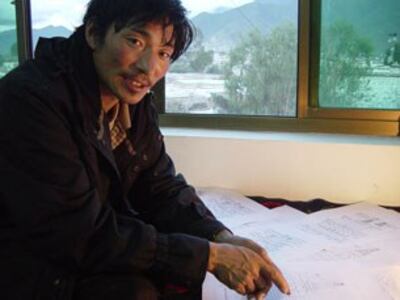WASHINGTON—Award-winning Tibetan environmentalist Rinchen Samdrup, 44, was sentenced on Saturday to five years in prison on charges of "inciting to split the nation."
The Chamdo Intermediate People’s Court found Samdrup guilty of "splittism" based on evidence that an article about the Dalai Lama had been posted on Samdrup’s Web site.
Samdrup pleaded not guilty and said during the trial that someone else had posted the article.
“The court recessed for 20 minutes and the verbal verdict of five years imprisonment was given, which seems to have been decided long before the hearing in court,” Samdrup’s eldest daughter Dorjee Sangmo said.
Rinchen Samdrup’s sentence comes just over one week after his brother, Karma Samdrup, was sentenced to the maximum penalty of 15 years for grave robbery, on charges that had been originally dropped in 1998. Karma Samdrup was also involved in environmental activism.
Rinchen Samdrup had been running an environmental NGO in Gonjo county in the eastern part of the Tibet Autonomous Region, near Sichuan province.
The organization's work involves reforestation, publishing a magazine, and mobilizing local people to report poaching. The group had earned international awards including grants from Ford Motors and the Jet Li One Foundation.
Samdrup was detained in August 2009 after he had accused local officials in Gonjo county of hunting endangered animals.
“Our father had to face this situation because of some local government officials of Chamdo prefecture,” his daughter said.
“We the four family members were allowed to be inside the courtroom, but we were not allowed to meet him. We were not allowed to meet him since his detention in August last year. Our father was looking very weak. He was not allowed to sleep well and had been repeatedly interrogated,” she said.
His lawyer, Xia Jun, said the he had not been able to meet with Samdrup since his first court session in January.
“This case is unique and I tried my best to present my defense and prove his innocence. I am disappointed by this court decision. It is difficult to say anything more under this situation,” he said.
Rinchen Samdrup has 10 days to appeal the sentence, and his daughter said that he will be applying to a higher court in Lhasa. She said that the conviction document would be given to the lawyer within five days.
Relatives Targeted

“We don’t know whether this is a personal grudge by leading officials against this family or an attack on Tibetan environmentalists or a combination [of those],” Robbie Barnett, the director of modern Tibetan studies at the Weatherhead East Asian Studies Institute of Columbia University, said.
“Last year when I went to Beijing to appeal for my father, I wasdetained for ten days,” Rinchen Samdrup’s daughter said.
Rinchen Samdrup’s brother Karma Samdrup was detained in January after he had visited Rinchen in detention.
Their youngest brother, Chime Namgyal, 38, was detained in August alongside Rinchen Samdrup for helping him with his NGO work. Since then he has been serving a 21-month sentence of re-education through labor for harming national security.
In addition to the three brothers, two of the brothers’ cousins have also been targeted, according to Barnett.
Their cousin Sonam Choephel, was sentenced to one and a half years of re-education through labor after organizing a group to petition in Beijing on Rinchen Samdrup’s behalf, he said.
Another cousin, Rinchen Dorje, a monk who had worked with Karma Samdrup as his interpreter, was reported to have been detained by authorities in March, and his family says he is currently missing, according to Barnett.
Several artists and intellectuals have been detained or have disappeared in recent months in what activists say amounts to the broadest suppression of Tibetan culture and expression in years.
Tensions have frequently risen in Tibetan areas of China since deadly rioting broke out following days of peaceful protests by Tibetans in their capital, Lhasa, in March 2008.
“I think we can see very clearly that in the last two years Chinese security forces in Tibetan areas have significantly shifted their targets from monks, lower-middle class activists, nuns, etc., to intellectuals seen as cultural figures. And this is because those people were involved and were mobilized by the Chinese reaction to the protests of March 2008, Barnett said.
"And this [Rinchen Samdrup’s] case fits in with that general pattern."
Original reporting by Dolkar for RFA’s Tibetan service. Translated from the Tibetan by Karma Dorjee. Tibetan service director: Jigme Ngapo. Written for the Web in English by Rachel Vandenbrink. Additional reporting by newswires.
